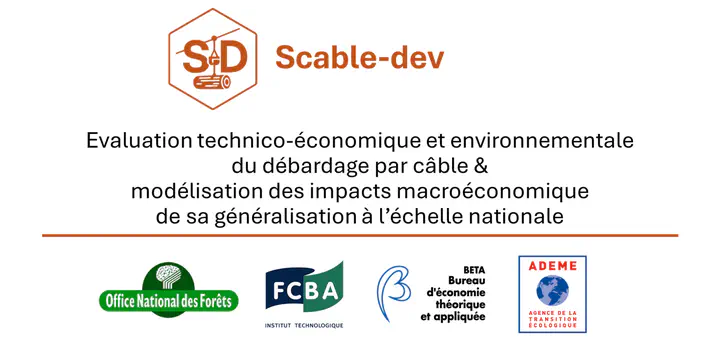Scable-dev

ongoing
Ground-based harvesting in French temperate forests frequently induces persistent soil compaction, undermining porosity, fertility, and long-term stand productivity. Managers often halt operations when soil moisture exceeds critical thresholds, leading to irregular mill supply and price volatility. Cable yarding offers a credible low-impact alternative by removing most machine traffic from the forest floor (≤ ~5% surface affected) and reducing fuel use by roughly 15–38% per cubic meter; yet adoption remains limited due to fixed set-up costs, incomplete performance evidence across contexts, and the absence of sector-level indicators.
Scable-dev (2025–2027, ADEME 170k€) aims to remove these barriers through an integrated micro-to-macro analysis. At the micro scale, the project will assemble and harmonize five years of operational records from the ONF National Cable Market and ~30 rigorously documented sites spanning topographies and volumes, to estimate robust cost–productivity relationships. At the macro scale, these coefficients and comparative energy/emission metrics will be injected into the French Forest Sector Model (FFSM++) to simulate progressive adoption scenarios (e.g., 10%, 35%, 60% of national volume) and their implications for prices, volumes, logistics, and carbon performance of the sector.
Methodologically, Scable-dev develops (i) a hierarchical mixed-effects cost function (€/m³) linking slope, extraction distance, line volume density, and silvicultural context, with firm-level random effects; (ii) a simplified ISO 14040/44 Life Cycle Assessment comparing cable yarding with ground-based systems on fuel use and GHG emissions; and (iii) probabilistic macro-sector simulations (sensitivity and Monte Carlo) within FFSM++, complemented by a stakeholder survey on adoption barriers and levers.
Expected outputs : a national, quality-controlled database of cable-yarding productivity; a validated predictive cost function (target adj. R² > 0.60; MAE < 5 €/m³); a comparative energy/GHG matrix; and policy-oriented FFSM++ scenarios with recommendations (regulatory options, targeted surcharges, training) to overcome adoption bottlenecks. Deliverables also comprise an open-source economic model, LCA summary sheets, and a synthesis report.